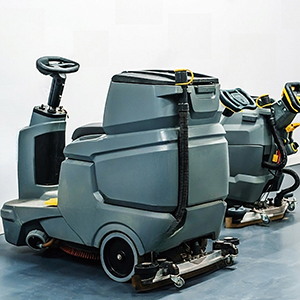Powering Floor Scrubbers: The Shift from Lead-Acid to Lithium Batteries
Powering Floor Scrubbers: The Shift from Lead-Acid to Lithium Batteries
In the floor scrubber industry, advancements in battery technology are driving a transformation. Lead-acid batteries are being replaced by lithium batteries, resulting in enhanced performance, greater safety, longer lifespan, and improved environmental friendliness. Below is an analysis of the multiple benefits brought by transitioning from lead-acid to lithium batteries for floor scrubbers.

1. Extended Runtime to Boost Efficiency
Traditional lead-acid batteries gradually lose power during discharge, impacting the cleaning performance of floor scrubbers. Lithium batteries, however, can maintain high power output throughout the discharge cycle, ensuring consistent cleaning performance. Their extended runtime reduces the need for frequent charging, significantly enhancing operational efficiency, especially for cleaning large areas.
2. Faster Charging Reduces Equipment Downtime
Lead-acid batteries generally require 8 to 12 hours to fully charge, limiting equipment availability. In contrast, lithium batteries charge in just 3 to 5 hours, allowing the equipment to return to work quickly and reducing waiting times. This quick charging capability boosts the utilization rate of floor scrubbers and helps minimize downtime.
3. Lightweight Design for Greater Maneuverability
Lead-acid batteries are often heavy, making floor scrubbers cumbersome to operate and move. Lithium batteries' lightweight design significantly reduces the equipment’s overall weight, enhancing the ease of maneuverability in confined areas. This feature is particularly valuable for cleaning in spaces like large shopping centers or parking structures.
4. Longer Battery Lifespan, Lower Maintenance Costs
Lead-acid batteries typically last between 400 and 500 charge cycles, while lithium batteries can exceed 2000 cycles, far surpassing traditional lead-acid options. This durability reduces the frequency of battery replacements, lowering long-term maintenance costs and delivering a more cost-effective solution for users.
5. Improved Safety for Reliable Operation
Lead-acid batteries can generate gas or excessive heat when overcharged or deeply discharged, presenting potential safety hazards. Lithium batteries, equipped with a Battery Management System (BMS), offer real-time monitoring of temperature and current to prevent overcharging or over-discharging. This feature lowers the risk of fire or explosion, providing safer and more reliable equipment operation.
6. Environmental Benefits Supporting Sustainability
Lead-acid batteries contain significant amounts of lead and sulfuric acid, posing environmental risks if not handled properly. Lithium batteries, on the other hand, are more environmentally friendly, with fewer toxic materials. The shift to lithium supports sustainability efforts in the cleaning equipment industry, reducing the environmental impact of disposal.
Conclusion
The transition from lead-acid to lithium batteries brings comprehensive improvements to floor scrubbers' performance and reliability. Lithium batteries, with their superior efficiency, safety, and environmental benefits, are the ideal power source for floor cleaning equipment. As lithium technology continues to advance, it will drive further innovation in the cleaning industry, offering users a safer, more efficient, and environmentally conscious cleaning experience.

